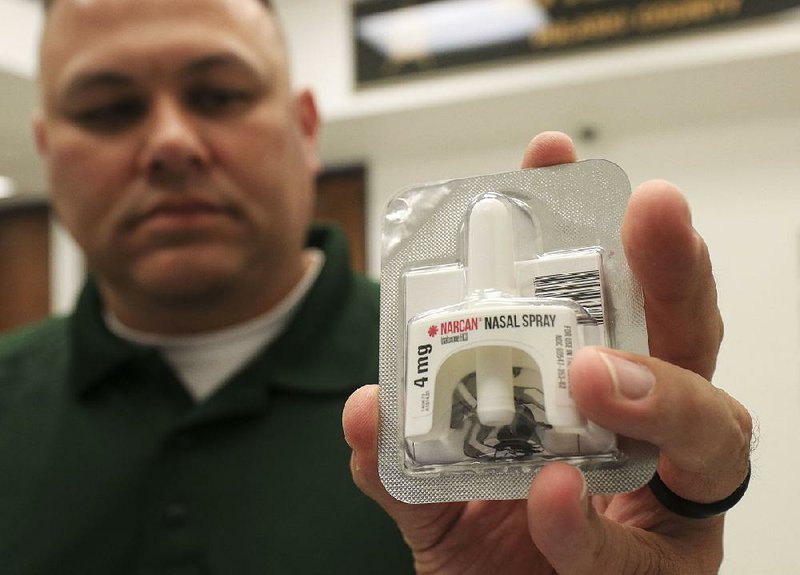The Arkansas State Police announced Tuesday that troopers will be equipped with Narcan, an anti-opioid medication that has already grown in use among law enforcement agencies in central Arkansas.
Narcan, a trademark name of naloxone, is a nasal spray that counteracts the effects of an opioid overdose and has been used to save multiple lives in Pulaski County, according to authorities. State police said all 526 commissioned personnel will be trained on how to administer the antidote, which is rapidly being adopted by law enforcement agencies across the U.S.
Bill Sadler, a state police spokesman, said a small number of commissioned personnel have already been trained, and the agency expects all personnel to be trained by the end of August. The agency purchased the drug for $47,088, and all commissioned personnel will be supplied with two doses, he said.
Narcan will be another tool for state troopers who come across an opioid overdose, Sadler said, especially in rural areas of the state where the anti-opioid drug may not be readily available compared with a metropolitan environment.
"Whatever the call may be, the trooper is now equipped with this drug to lessen the chance of that person dying," Sadler said, noting that troopers may come across an overdose victim while assisting other lawmen, conducting a traffic stop or interviewing a suspect.
In Arkansas, the state Health Department has recorded a rising number of overdose fatalities in recent years, with many attributed to the abuse of opioids such as methadone, hydrocodone and Oxycontin.
The number of overdose deaths in the state increased from 153 in 2011 to 227 in 2015, a 48 percent increase. The department tallied 958 fatalities in that five-year period.
The Narcan announcement drew praise from Gov. Asa Hutchinson, who said in a statement that the drug will ensure a path to treatment and recovery for people struggling with addiction.
"I applaud the Arkansas State Police in its effort to stem the tide of overdose deaths by expanding access to the life-saving drug Naloxone," Hutchinson said in the statement.
The nation's opioid epidemic has drawn concern from federal and state leaders. A number of central Arkansas law enforcement agencies provide naloxone to officers so they can respond quickly to overdoses.
Addressing the National Sheriffs' Association earlier this summer, U.S. Deputy Attorney General Rod Rosenstein said that opioids are causing "unprecedented destruction" in U.S. communities.
"I know that many of you come face-to-face with this destruction on every shift. In many jurisdictions, law enforcement officers respond to so many overdose calls on a daily basis that Narcan is now as indispensable to their work as handcuffs," Rosenstein said, according to a copy of the speech on the Justice Department's website.
Incoming Arkansas Drug Director Kirk Lane said addiction to opioids often starts with prescription pills. The addiction to prescription pills can then push people to use heroin, which has been on the rise in the state, he said.
In 2015, under Lane's leadership as police chief, Benton police officers were the first in Arkansas to carry Narcan.
"I think it's fantastic that they found the funding," he said, praising the state police's decision to purchase Narcan. He said Narcan creates a safer situation for the person suffering from an overdose, but also for the authorities responding to the scene.
But Lane warned that Narcan is a temporary solution to an overdose, and anybody treated by the anti-opioid drug will need to immediately seek medical attention. The effects of an opioid can outlast the effect of Narcan, and overdose symptoms can return.
Lane will leave the Benton Police Department on Sunday and will start the next day as Arkansas drug director, serving as chairman of the Arkansas Alcohol and Drug Abuse Coordinating Council and coordinating alcohol and drug abuse prevention initiatives.
Besides the state police and Benton, other central Arkansas law enforcement agencies that have acquired Narcan kits include the Pulaski County sheriff's office and police departments in Maumelle, North Little Rock and Jacksonville.
Since issuing Narcan to deputies in April, the Pulaski County sheriff's office has reported several life-saving interventions.
Specifically, the agency reported in May that two people were revived using Narcan. The agency statement said that one person was found unresponsive in a patrol unit, and another person had attempted suicide by consuming fentanyl, a powerful synthetic painkiller.
Little Rock police are in the process of acquiring Narcan for officers, said spokesman Steve Moore. The department will not have enough Narcan doses to supply all officers, he said, but officials are meeting later this week on how to train officers to administer the antidote.
Information for this report was provided by Brandon Mulder of the Arkansas Democrat-Gazette.
Metro on 08/02/2017

